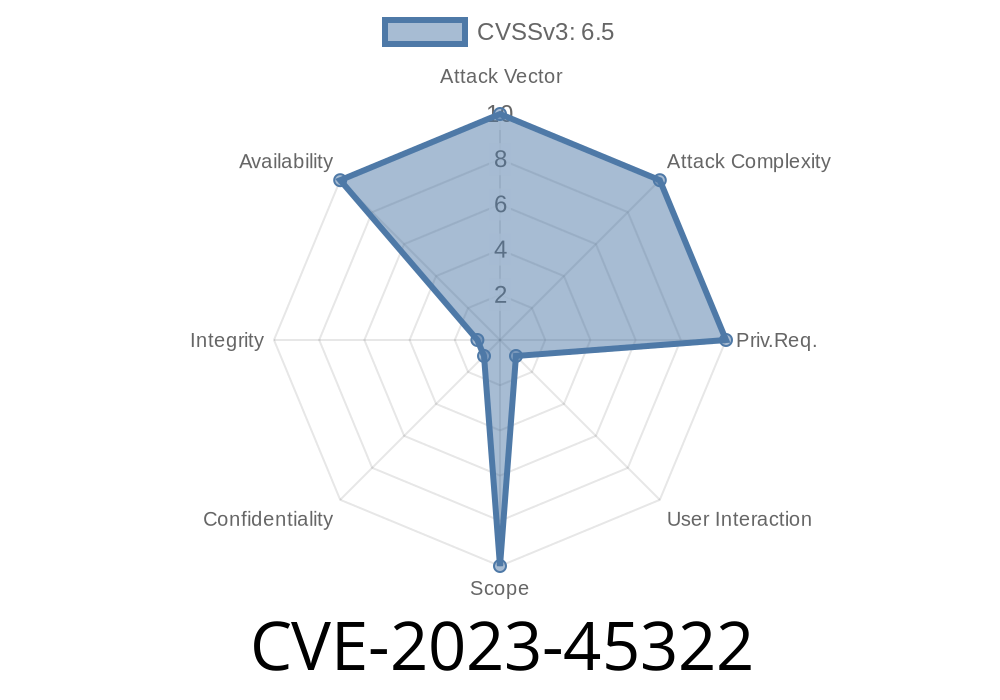If you work with XML in C, you’ve almost certainly used libxml2, one of the most popular XML parsing libraries. It’s widely used in Linux distributions, web servers, and many other open-source projects. While libxml2 is usually considered robust, it’s not immune to the occasional bug—especially those that are hard to spot or exploit.
One such vulnerability is CVE-2023-45322, which was disclosed in October 2023. This issue highlights a *use-after-free* bug that occurs after a failed memory allocation inside the xmlUnlinkNode function in tree.c. The bug has existed in libxml2 up to version 2.11.5.
In this post, I’ll explain what the vulnerability is, show you where it happens in the code, discuss why it’s tricky to exploit, and explain why the vendor doesn’t see it as a critical risk.
The Vulnerability Explained
In short, CVE-2023-45322 is a *use-after-free* bug, which means the program ends up using memory after it has been freed. This happens in libxml2’s xmlUnlinkNode() function, if a memory allocation fails at just the right time.
Typically, such vulnerabilities can lead to data corruption, crashes, or even remote code execution, if the attacker can manipulate memory. But in this specific scenario, exploiting the bug is challenging because it relies on a failed memory allocation, something an attacker can't usually control.
Where Is the Bug?
The vulnerability lies here in tree.c in libxml2's source, specifically inside xmlUnlinkNode().
Here’s a relevant snippet from the vulnerable code
void xmlUnlinkNode(xmlNodePtr cur) {
if (cur == NULL)
return;
/* ... precondition and checks ... */
/* Remove from the parent's children list */
if (cur->parent != NULL) {
if (cur->parent->children == cur)
cur->parent->children = cur->next;
if (cur->parent->last == cur)
cur->parent->last = cur->prev;
}
/* Remove from siblings */
if (cur->prev != NULL)
cur->prev->next = cur->next;
if (cur->next != NULL)
cur->next->prev = cur->prev;
cur->next = NULL;
cur->prev = NULL;
cur->parent = NULL;
/* ... more logic here ... */
}
But the imagination comes in when memory is tight: suppose cur points to a node whose un-linking triggers a memory allocation (perhaps in a later part of this function or in code that uses the unlinked node).
If this allocation fails, and libxml2 frees memory early as part of its error handling, but later code continues to use the same node pointer—or one of its members—you have a *use-after-free*.
> See the specific patch:
> https://gitlab.gnome.org/GNOME/libxml2/-/commit/cba012b364fd17467db52d6aa2c2f5a7743f334e
The Challenge: Exploiting Only After Allocation Fails
Unlike classic use-after-free bugs, which can often be triggered with attacker-controlled data, this bug manifests only after an allocation fails. In practice, that means an attacker would need to either force the target process into an out-of-memory state or somehow predict exactly when a memory allocation will fail.
Why is This Hard?
- Most modern systems have plenty of RAM: Getting malloc() to fail at just the right time is very tough.
- Attacker control is low: In normal operation, external input (like crafted XML) doesn’t let you time memory exhaustion precisely.
- Resulting behavior is unpredictable: Even if allocation fails, the process might just crash, rather than doing anything an attacker can predict.
The maintainers of libxml2 commented that
> “I don't think these issues are critical enough to warrant a CVE ID ... because an attacker typically can't control when memory allocations fail.”
Nonetheless, the issue was ultimately assigned CVE-2023-45322 for tracking purposes.
Proof-of-Concept: What Would an Exploit Look Like?
Let’s look at a theoretical exploit. In a contrived scenario, an attacker would need to trigger the xmlUnlinkNode() call after first causing the application to exhaust its memory. Here’s a *simplified* code example—note that this is only for illustration. The real challenge is forcing the allocation to fail:
#include <libxml/tree.h>
int main() {
// Simulate out-of-memory by allocating large blocks
for (int i = ; i < 100000; ++i) {
malloc(1024 * 1024); // eat up RAM
}
// Now, massage the XML so that xmlUnlinkNode runs
xmlDocPtr doc = xmlNewDoc(BAD_CAST "1.");
xmlNodePtr root = xmlNewNode(NULL, BAD_CAST "root");
xmlDocSetRootElement(doc, root);
// Remove node (triggers xmlUnlinkNode)
xmlUnlinkNode(root);
// Free memory
xmlFreeNode(root);
xmlFreeDoc(doc);
}
If malloc fails at just the right instant (after all that RAM pressure), xmlUnlinkNode() could run into a state where it frees the node early and uses it later—triggering a potential use-after-free.
*But practically, it’s tough to make this reliable.*
Mitigation and Fixes
The upstream maintainers addressed this by tightening error handling to prevent use-after-free, even in the face of allocation failures. The fix was merged and is available in libxml2 after version 2.11.5.
> Patch details:
> *Commit cba012b3, October 2023*
References
- libxml2 Project Home
- Official Patch (GitLab)
- CVE Entry on NVD
- Original Issue Report
Conclusion
CVE-2023-45322 is a reminder that even state-of-the-art libraries can have rare but real bugs, especially with error-handling in edge cases like memory allocation failures. While this bug is not likely exploitable in the real world, it’s still good practice to update your libxml2 to a patched version to stay safe.
If you maintain systems or software that uses libxml2, just keep your dependencies updated—and don’t lose sleep over this one! The odds of exploitation are very, very low.
Have questions or want to discuss more C/C++ security gotchas? Drop a comment below!
Timeline
Published on: 10/06/2023 22:15:11 UTC
Last modified on: 11/07/2023 04:21:45 UTC
